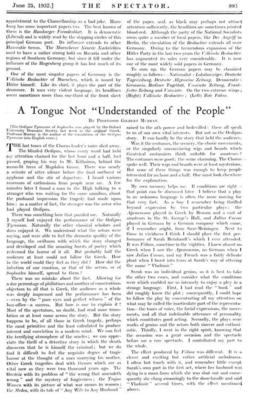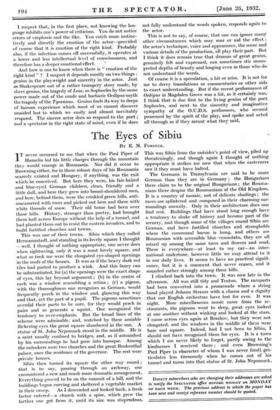A Tongue Not "Undetstanded of the People"
BY PROFESSOR GILBERT MURRAY.
(The Oedipus Tyrannus of Sophocles was played by the Oxford University Dramatic Society last week in the original Creek. Professor Murray is the author of the translation of the Oe(Opus Tyrannua into English verse.]
TIHE last tones of the Chorus-leader's voice died away.
The blinded Oedipus, whose every word had held my attention chained for the last hour and a half, had passed, groping his way to Mt. Kithairon, behind the moon-lit- trees of Magdalen Grove. There was nearly a minute of utter silence before the final outburst of applause and the stir of departure. I heard various murmurs of enthusiasm from people near me. A few minutes later I found a man in the High talking to a stranger who was waiting for the same omnibus, about the profound impression the tragedy had made upon him ; as a matter of fact, the stranger was the actorwho had played Oedipus.
There was something here that puzzled Inc. Naturally I myself had enjoyed the performance of the Oedipus Tyrannus. Naturally the other classical scholars and dons enjoyed it. We understood what the actors were saying, and were able to feel the dramatic quality of the language, the swiftness with which the story changed and developed and the amazing bursts of poetry which redeemed the horror of it all. But probably half the audience at least could not follow the Greek. How in the world could they feel as they did ? How did the infection of our emotion, or that of the actors, or of Sophocles himself, spread to them ?
There was no mistake about the fact. Allowing for a due percentage of philistines and another of conscientious objectors to all that is Greek, the audience as a whole was deeply impressed and the performance has been —even by the " pure eyes and perfect witness " of the box-office—a success. But how is one to explain it ? Most of the spectators, no doubt, had read some trans- lation or at least come across the story. But the story happens to be, of all those in Greek tragedy, perhaps the most primitive and the least calculated to produce interest and conviction in a modern mind. We can feel the terrifying atmosphere of the oracles ; we can appre- ciate the thrill of a detective story in which the sleuth discovers that he is himself the criminal ; but we do find it difficult to feel the requisite degree of tragic horror at the thought of a man marrying his mother. Other Greek tragedies deal with themes which are as vital now as they were two thousand years ago. The Oresteia with its problem of "the wrong that amendeth wrong" and the mystery of forgiveness ; the Trojan Women with its picture of what war means to women ; the Medea, with its tale of " Any Wife to Any Husband "
raised to the nth power and bedevilled : these all speak to its of our own -vital interests. 13ut not so the Oedipus story. It eats hardly be the story that held the audience.
Was it the costumes, the scenery, the choric movements, or the singularly unconvincing wigs and beards which theatrical costumiers think suitable for amateurs ? The costumes were good ; the scene charming. The Chorus • spoke well. Their wigs and beards were at least mysterious. But none of these things was enough to keep people interested for an hour and it half. One must look elsewhere for the explanation.
My own memory helps me. If conditions are right -- that point can be discussed later —I believe that a play in an unknown language is often the more moving for that very fact. As it boy I remember being thrilled beyond expression by two particular plays : the Agamemnon played in Greek by Benson and a cast of amateurs in the St. George's Hall, and Julius Caesar played in German by a German company which came, if I remember aright, from Saxe-Meiningen. Next to those in vividness I think I should place the first per- formance of Sarah Bernhardt's which I ever attended. It was Fedora, sometime in the 'eighties. I knew almost no Greek when I saw the Agamemnon, no German when I saw Julius Caesar, and my French was a fairly delicate plant when I burst into tears at Sarah's way of uttering the name " Vladimir."
Sarah was an individual genius, so it is best to take the other two eases, and consider what the conditions were which enabled me so intensely to enjoy a play in a strange language. First, I had read the " book " and did roughly know the plot ; consequently, I could hope to follow the play by concentrating all my attention On what may be called the inarticulate part of the representa- tion—the tones of voice, the facial expressions, the move- ments, and all that indefinable utterance of personality which constitutes good acting. Secondly, the plays were works of genius and the actors both sincere and enthusi- astic. Thirdly, I went in the right spirit, knowing that: the occasion was a great occasion and the spectacle before me a rare spectacle. I contributed my part to the whole.
The effect produced by Faint was different. It is a clever and exciting but rather artificial melodrama. I often lost touch with it, and remember little except Sarah's own part in the first act, where her husband was dying in a room front which she was shut out and conse- quently she clung swooningly to the door-handle and said "
Vladimir" several times, with the effect mentioned above. I suspect that, in the first place, not knowing the lan- guage inhibits one's power of criticism. You do not notice errors of emphasis and the like. You catch more instinc- tively and directly the emotion of the actor—provided of course that it is emotion of the right kind. Probably also, if the infection comes off successfully, it operates at a lower and less intellectual level of consciousness, and therefore has a deeper emotional effect.
And how is one to know when there is "emotion of the right kind " ? I suspect it depends mostly on two things : genius in the playwright and sincerity in the actor. Just as Shakespeare out of a rather trumpery story made, by sheer genius, the tragedy of Lear, so Sophoeles by the same power made out of the crude and barbaric Oedipus-myth the tragedy of the Tyrannus. Genius finds its way to deeps of human experience which most of us cannot discover unaided but to which we easily and almost inevitably respond. The sincere actor does so respond to the poet ; and a spectator in the right state of mind, even if he does
not fully understand the words spoken, responds again to the actor. -
This is not to say, of course, that one can ignore many other circumstances which may mar or aid the effect : the actor's technique, voice and appearance, the scene and various details of the production, all play their part. But I think it does remain true that dramas of great genius, genuinely felt and expressed, can sometimes stir unsus- pected depths of beauty,and longing even in those who do not understand the words.
Of course it is a speculation, a hit or miss. It is not for me to decry translations or commentaries or other aids to exact understanding. But if the recent performance of Oedipus in Magdalen Grove was a hit, as it certainly was, I think that is due first to the living genius of the poet Sophocles, and next to the sincerity and imaginative sympathy of the O.U.D.S. performers, who seemed possessed by the spirit of the play, and spoke and acted all-through as if they meant what they said,



































 Previous page
Previous page